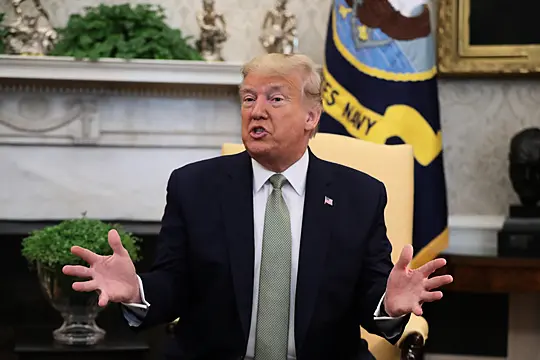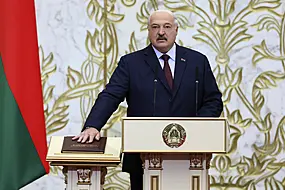Former President Donald Trump is escalating a political war within his own party that could undermine the Republican push to fight President Joe Biden’s agenda and ultimately return to power.
A day after blistering Mitch McConnell, the Senate’s top Republican, as a “dour, sullen and unsmiling political hack” Mr Trump repeated the baseless claim on Wednesday that he was the rightful winner of the November election.
Republican officials in several battlegrounds carried by Mr Biden, including Georgia and Arizona, have said the vote was fair. Mr Trump’s legal claims surrounding the vote were rejected by judges across the political spectrum, including many appointed by the former president.
Mr McConnell himself described Mr Trump’s contention as an “unhinged falsehood”.
Leading GOP strategists described the exploding feud between the former Republican president and the Senate’s most powerful Republican as, at best, a distraction and, at worst, a direct threat to the party’s path to the House and Senate majorities in next year’s midterms.

“I don’t think he (Mr Trump) cares about winning,” Steven Law, a McConnell ally who leads the most powerful Republican-aligned super PAC in Washington. “He just wants it to be about himself.”
Mr Law noted Mr Trump lost several states where Republicans face must-win Senate elections in next year’s quest to break up Democrats’ control of Congress, including in Arizona, Georgia, Pennsylvania and Wisconsin.
Republicans are also competing in Nevada and New Hampshire, where Mr Trump was defeated, and in North Carolina, where Mr Trump barely won.
If Mr Trump tries to make himself “the centre of attention”, Law said, “that actually could cost Republicans seats in the general election.”
Such infighting is not altogether unusual after a political party loses the White House, but in this case, the feuding factions have been unusually willing to attack each other publicly.
There was also a broad consensus on Wednesday that the ugly intra-party clash would likely extend well into next year’s congressional primary season.
The stakes may be higher this time, however, as key players — Mr Trump, among them — have also openly threatened the prospect of creating a new political party, which would endanger the Republican Party’s very existence.
Roughly 120 anti-Trump Republicans, including current and former officeholders, secretly convened earlier in the month to contemplate the future of the GOP.
A total of 40% supported the idea of creating a new party, according to an internal survey provided by one of the meeting’s organisers, former independent presidential candidate Evan McMullin.
“There’s a lot of energy out there for something new,” Mr McMullin said, while encouraging Mr Trump to follow through with his threats of creating a Patriot Party.
“Frankly, I would welcome him to start a new party and take his most loyal supporters with him. I think that would be a wonderful thing for the party and the country.”
Mr Trump’s specific plans are still coming together.
He has been banned from Facebook and Twitter for inciting violence, but on Wednesday, he broke his month-long media blackout by giving his first interview since leaving the White House.
While his plans remain a work in progress, aides have been discussing his options and were creating what one former adviser described as a “political slash media enterprise” that would both help him promote Trump-allied candidates and provide a media platform that would allow him to speak directly to his supporters, instead of having to go through the mainstream media.
Regardless of how he communicates with his loyalists, Mr Trump made clear this week that he will not retire quietly.







